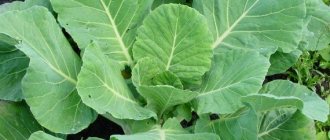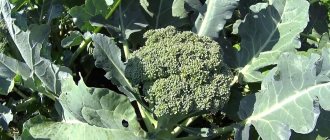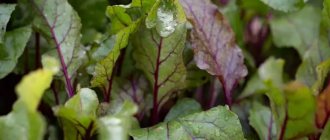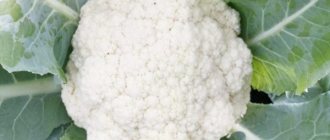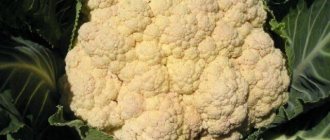If cabbage is bitter, what should you do? Why does cauliflower taste bitter after cooking?
Cauliflower is very popular due to its special taste and beneficial qualities. Each housewife has her own special recipe for preparing this vegetable. But sometimes cabbage begins to taste bitter after cooking, which spoils its taste. Why is it bitter and how to remove the bitterness? Find answers to these questions in our material.
Causes of bitterness
Cauliflower is an amazing vegetable whose taste is liked by almost everyone without exception. It is used to make puree for baby food, steamed or fried in batter. This vegetable contains a large amount of vitamins and healthy proteins, but sometimes, during cooking, such a nuisance occurs as the appearance of bitterness in cauliflower. Of course, this can ruin anyone's mood. Why does it start to taste bitter after cooking? There may be several reasons.
Let's start with the fact that by its nature, cauliflower is prone to bitterness: the quality of the taste depends on the correct cultivation of the fruit. If the vegetable was grown without observing the necessary standards, and during growth the plant lacked moisture, the cabbage takes on a slightly bitter taste. In addition, bitterness may occur due to excessive nitrate content in cabbage. Undoubtedly, cauliflower, like all vegetables and fruits, must be tested for the amount of nitrates before being placed on the shelves of vegetable markets.
When choosing this vegetable, try to choose a medium-sized fruit. The inflorescences should be dense, and the head itself should be weighty and have a uniform white color. Choosing the right cabbage affects its quality and taste.
Many lovers of this vegetable feel the bitterness of the product after cooking. You don’t want to throw everything into the trash can, so you can try to get rid of the bitterness. There are several proven methods for this, which we will discuss below.
How to remove bitterness?
Anyone who likes to eat this vegetable knows that it should be boiled a little before frying. We recommend boiling the cabbage in lightly salted water - this will help get rid of the bitter taste. If you do not plan to pre-cook the cauliflower, you can simply pour boiling water over it. Boiling water should also be salty.
Separate the cauliflower into florets. If you are convinced that the fruit has a bitter taste, then fill a saucepan with water and immerse all the inflorescences in it. The water can be cold, but must be salted. If you do not eat salt, you can add a little citric acid or freshly squeezed lemon juice to the water. Acidified water can also easily cope with bitterness. After fifteen minutes of this soaking, the cabbage can be cooked in any usual way.
How to cook it correctly?
In order for cauliflower to benefit the human body and delight everyone with its unique taste, you need to be able to cook it correctly. We will reveal several secrets of preparing delicious cabbage that will be useful to all lovers of healthy eating.
Before you start preparing any dish, you should properly disassemble the cauliflower into inflorescences. This is quite easy to do: just separate them from the stalk. Try not to leave the main stem. It is best to separate the inflorescences at the base, where the branches begin.
Darkened areas should be cut out and not used for food. Once the cabbage is prepared, we recommend using one of the above methods to get rid of the bitterness.
Many people wonder how long it takes to cook cabbage. There is no definite answer, since it all depends on what you plan to cook after. For example, if you cook cabbage in a slow cooker, then you should not cook it for more than six minutes, and in a double boiler - more than twenty minutes.
Inflorescences should only be placed in boiling water. A pinch of citric acid will not only get rid of bitterness, but will also preserve the snow-white color of the vegetable, preventing it from turning yellow after cooking.
To ensure that the vegetable is cooked correctly and is not too soft after cooking, do not add too much water to the container. Moreover, this not only worsens the taste of the vegetable, but also deprives the cabbage of some beneficial substances.
If an unpleasant odor spreads throughout the kitchen during cooking, you can eliminate it with the help of crackers. Place one piece in a pan and there will be no smell. In order to improve the taste of the vegetable, you can add a little sugar to boiling water.
To make sure that the cabbage is ready, just pierce the base of the inflorescence with a knife. If the blade slides in easily, the vegetable is ready. As soon as the cabbage is cooked, be sure to drain the water; do not leave the inflorescences in hot water.
To learn how to properly boil cauliflower, watch the following video.
After harvesting or purchasing white cabbage, the housewife may discover bitterness in it. Cabbage is bitter for several reasons.
Causes of bitterness in fresh cabbage
Why is cabbage spicy? Gardening: Why is cabbage bitter?
Where does the bitterness come from?
I took a head of pickled cabbage for testing, and at home I discovered that it was bitter. Could cabbage turn brown if hot peppers grew next to it all summer? Or is it something else? This is the first time in my life that I have encountered such a phenomenon.
Marina Asmolova, Chelyabinsk
Agronomist of the Knowledge Society Lyudmila Reshetnikova answers:
“Indeed, phytoncides of hot pepper could penetrate the cabbage tissue and cause bitterness. There is nothing wrong with this; your pickled cabbage will acquire a piquant spiciness. But for the future, keep in mind what such a neighborhood can lead to. In addition, some late varieties of cabbage, if harvested before their due date (October-November), may taste bitter. These are varieties with dark bluish leaves, denser flesh and hard veins on the leaves. Before salting such cabbage, let it sit for a while.
What field are the berries?
My husband and I couldn’t decide for a long time: if watermelon is a berry, then so is melon? What about zucchini and pumpkins then? They seem to be from the same family.
Svetlana Anatolyeva, Poletayevo
- You are right, according to its biological characteristics, a melon is also a berry, just like a watermelon. These two crops are called melons, and there is no doubt about their berry origin. But pumpkins, zucchini and cucumbers belong to a slightly different family - the Cucurbitaceae, and are, after all, closer to vegetables.
Don't rush to dig a turnip
This year I grew turnips for the first time. But I don’t know how to store it correctly.
Nikolay Zamyatin, Chelyabinsk
— Turnips are a root vegetable from the same series as radishes, beets and carrots, so they are stored in the same way. Basic rules: stop watering a month and a half before harvesting, harvest in dry weather, if it rained before, wait at least three days. Usually in our region, beets and radishes are harvested in early October. So don’t rush to dig your own turnip. Dry it slightly on the bed, then put it in bags or boxes with sand, and store it in the cellar.
Vegetable puree soup
I love autumn for the opportunity to try such simple, healthy and nutritious soups.
- One small fork of cauliflower
- One medium potato
- Bulb
- 50 gr. butter
- 200 ml cream
- 50 gr. favorite hard cheese
- Melt the butter and add finely chopped onion to it. Simmer over low heat until the onion is soft
- Boil the remaining vegetables in a saucepan
- Mix the cream, vegetables, remaining broth (no more than 500 ml) and pass the mixture through a blender
- Pour into bowls and add grated cheese
You can also add homemade crackers. It will turn out very tasty.
Why does Chinese cabbage taste bitter in salad? Why is fresh cabbage bitter?
For several centuries, cabbage has been very popular and is a very healthy and nutritious vegetable. It began to be grown back in the Stone Age. It is assumed that the spread began in Ancient Rome.
Even then there were several types and varieties. Cabbage appeared on the territory of Rus' in the eleventh century. The word “cabbage” itself comes from the Latin word “kaput”, which means “head”.
In this article we will look at why cabbage is bitter and the reasons for the bitterness of cabbage.
note
Today it is simply impossible to imagine your life without this popular vegetable. Hundreds of famous dishes are prepared on its basis. Cabbage can be an independent dish, or just a side dish.
But it happens that such a tasty and healthy vegetable crop brings disappointment. Sometimes cabbage leaves have a very unpleasant and alarming bitterness. Is it possible to use this cabbage for food? How to cook it? All these questions are asked by housewives when faced with such a problem. There are the best winter varieties that do not produce bitterness
Causes of bitterness
The presence of bitterness is the prerogative of almost all cruciferous plants. Bitterness can occur in almost all varieties. For example, the well-known “amager” almost always has a bitter taste. And it is useless to fight it. But sometimes the following reasons can be to blame for spoiled taste:
- Immaturity. If a vegetable has not ripened in the garden, it may taste different and often not for the better.
- Insufficient moisture. In dry summers, due to insufficient watering, any variety will taste bitter.
- Soil composition. The vegetable takes all the useful substances from the soil, but if the soil has an excess of minerals and nitrogenous compounds, the cabbage will not have a very pleasant taste.
- Excess nitrates. Unscrupulous producers often violate the technology of growing vegetables. And they use too many nitrates for rapid growth and a beautiful presentation. If the first three reasons are easily removable and it is quite possible to get rid of bitterness, then in the latter case, it will not be possible to improve the taste of the product. Nitrates are not removed during heat treatment, and even soaking, in this case, will not correct the situation at all. It is better not to eat a vegetable poisoned by nitrates.
Ways to get rid of bitterness
- Heat treatment. Clean the forks and wash them well. Cut and boil for 10 minutes, drain. After this procedure, the taste will improve significantly, the bitterness will disappear.
- Salt.
Finely chop the head of cabbage, sprinkle with salt and mix thoroughly. Allow time to stand for the juice to release. When it separates, drain well. Salt will help restore the pleasant taste. You can also ferment cabbage. - Lemon juice. Another effective and simple way to combat bitterness is soaking in a solution of lemon juice.
How to get rid of bitterness
Soaking in water will remove the bitterness of fresh cabbage.
The bitterness from the heads of early varieties goes away if you put their leaves in boiling water for a minute. You can also remove the bitterness from cabbage by finely chopping it and then keeping it in water for half an hour.
Sauerkraut will not taste bitter if you pierce it in 5-10 places with a thin wooden stick 2-3 days after pickling, and then place it in a cold place. Sauerkraut is washed only with cool boiled water, but not hot or warm: this will deprive it of its taste and all its beneficial substances.
If late cabbage is noticeably bitter, due to the fact that it was picked before the first frost, its bitterness cannot be removed: it will not disappear even after storage.
Sauerkraut or fresh cabbage, which due to long storage has lost its positive qualities and is bitter, must be thrown away without regret.

